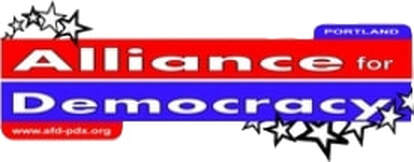About Public Banking
|
|
What is a public bank? PDF printable copy
A public bank is owned by the people through their representative government, which could be a city, county, state, tribe, or Federal entity. It can receive deposits of public funds (taxes, fees, fines, and interest earned) from, and make loans to, the government that establishes, and owns it. By minimizing operational costs and recirculating bank profits back to the people, public banks enhance the financial health of the general fund. It may also choose to partner with local financial institutions to expand the lending capacity for the local economy. A public bank would have a public charter, a democratically constructed statement of public purpose and public mandate outlining its reason for existing, the goals of the representative government. For example: to deliver quality, sound financial services to help meet the mission of the city: to be prosperous, equitable, healthy and resilient. The remaining document will focus on a municipal public bank of Portland. A municipal public bank is NOT: • Operated by politicians; rather, it would be run by professional, experienced bankers. • Boondoggles for bank executives; rather, its employees are salaried public servants (paid by the city, with a transparent pay structure) who would likely not earn bonuses, commissions or fees for generating loans. • A risky speculative venture that maximizes profits in the short term, without regard to the long-term interests of the public. Why are Public Banks urgently needed?
How is a public bank different than a private bank?
Would a municipal public bank compete with local community banks and credit unions? No, a municipal bank would not compete with local community banks and credit unions. Instead the municipal bank could partner with community banks/credit unions allowing them to make loans in the local community which they might not be able to make on their own, thereby enhancing the mission of community banks/credit union to support and develop the local economy. A Portland municipal bank would not be a retail bank. It would have no “street corner presence.” It would not accept deposits from the public. How would it work? (See below for capitalization) ● Portland tax and other revenues would be deposited in the Portland municipal public bank. ● The bank would process payments for city government expenses. ● The bank would reduce the costs to the city of financing short-term borrowing and infrastructure investments by lending to ourselves and avoiding high interest rates from other lenders. ● The bank would earn interest on its investments and on loans it makes in partnership with local community banks and credit unions. ● In order to ensure the long-term financial health of the bank, the bank could also make significant investments in secure bonds. ● Lending priorities could be set by a public participation process. ● The bank could eventually issue loans in cooperation with community banks and credit unions, to fulfill the purposes of the bank as set out in its charter. How would the municipal bank be created? The bank could be created either as a result of an initiative or referendum, or by Act of the city council. Would Taxes need to be raised? Taxes would not be used to establish, capitalize, or fund the ongoing expenses of a public municipal bank. Where could a city get the money to establish and fund a public bank? The capitalization (initial money needed to establish a bank) of a municipal bank could happen via several methods. One method would be for the city to grant a one-time appropriation of funds to establish the bank out of current funds, such as rainy day funds, that are being held in Wall-Street banks. Such an appropriation would be a loan, payable back to the city. Another method to build these funds could be by selling non-voting shares to the general public. Funding for the ongoing expenses of running the bank would come from earnings from loans and investments. This could also include the interest money saved by being our own bank and making loans for city projects with lower interest payments than is currently paid to Wall-Street banks, effectively saving the city millions of dollars. Additionally we would not be at the mercy of Wall-Street bank interest rates, but would be loaning to ourselves at the lowest interest rate possible to fund the operation of our bank. How would a public municipal city bank be governed? - The bank would be a legally separate entity from the City of Portland as an independent banking institution. - The bank would have an independent Board of Directors which could be selected by the City Council. Another model would allow the mayor, members of city council, and the public financing advisory board to nominate directors, to be confirmed by the City Council, for defined terms. - Directors would be selected according to criteria such as requisite expertise, demonstrated commitment to the mission of the Bank, and representation of constituencies typically excluded from decisions about public finance. - The bank would be run by professional bankers in good standing, not by politicians. - To ensure transparency, an independent annual audit would be required with the result made public immediately. - If private shares were ever sold in the public municipal bank, restrictions would exist so that control of the bank would always remain with the City. Such private shares would always be non-voting shares. |
Public Banking efforts in
other areas STATES Arizona Colorado Connecticut New Hampshire New Mexico Pennsylvania CITIES Albuquerque Boston Oakland Santa Fe Seattle Washington DC |

